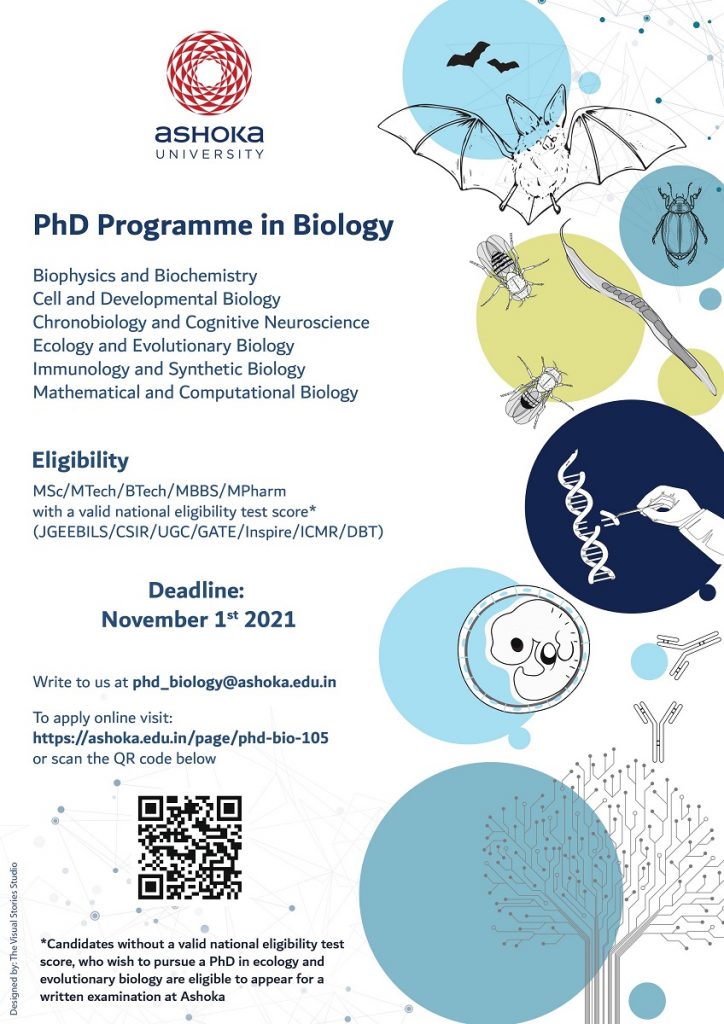Orientation
The incoming cohort of Ph.D students will undergo a half-day departmental orientation. During this orientation session,
-
All faculty members intending to recruit Ph.D students will give a 20-minute presentation highlighting their research and possible Ph.D projects in their group. This will allow all the incoming students to get an overall idea of various research opportunities in the department.
-
The students will be apprised of the Ph.D. program, various timelines, course requirements and laboratory policies.
Appointment of Supervisor
Thereafter, the students will be encouraged to interact with as many faculty members they deem necessary to decide on a Ph.D. supervisor. A maximum of two faculty members may co-supervise a student, one of who should be from the department of biological sciences. The other co-supervisor with an expertise relevant to the student’s proposed research, maybe from any department within or outside Ashoka University. The student will formally e-mail the Ph.D program coordinator their first three choices for faculty supervisor within 4 weeks of the admission date.
The Coordinator (Biological Sciences Ph.D. Program) will assign each student a faculty supervisor in consultation with the faculty committee of the department.
In the event that two or more students have the same faculty as their choice, then it would be up to the faculty to pick student(s) depending on positions available in the lab.
Formation of the Student Research Committee (SRC)
The student, in consultation with the primary faculty supervisor (and co-supervisor, if any), should select a committee consisting of two persons in addition to the primary faculty supervisor (and co-supervisor, if any) to serve as the Student Research Committee (SRC). One of the non-supervisory members will act as the chairperson. This will be communicated to the Ph.D. program coordinator.
Roles of the SRC – The role(s) of SRC comprises (but is not limited to) the following
-
The SRC functions to assist supervisors in providing guidance and advice on students’ research, by complementing the expertise of supervisor/s. SRC members will read the required progress reports, judge whether there is satisfactory progress through the program, and approve the reports.
-
They actively mentor the student in case of supervisor’s non-availability or during disputes between supervisors and the student. Therefore, the SRC members should be reasonably accessible to students when called upon for discussion of students’ academic progress or for consultation on issues related to the research project and for general guidance.
-
Students are encouraged to meet informally with SRC members for academic or research matters as well as seek advice on career options.
Coursework
The graduate courses offered by the department are listed below*.
-
Research Methodology (Mandatory)
-
Graduate Seminar Series in Biological Sciences (Mandatory)
-
Programming in Biology
-
Advanced Biochemistry and Biophysics
-
Bioimaging and Quantitative Methods in Biology
-
Advanced Cell Biology
-
Advanced Molecular Biology
-
Concepts in Mechanobiology
-
Current Advances in Developmental Biology
-
Plant and Microbial Development
-
Evolutionary Biology
-
Biostatistics
-
Immunology
-
Chemical and synthetic biology
-
Next-generation sequencing data analysis
-
Macromolecular structure determination
-
Host-pathogen interaction
-
DNA replication and repair
-
Specificity in gene expression
-
Cell signalling
-
Ecological Modelling
(*Some of the courses may not be offered every year. Please contact the relevant faculty for updated information)
Students with an MPhil/MTech degree are required to complete at least 8 credits of 600-level course work (2-3 courses) within 18 months from the date of admission. Students with an MSc/MA/Mcom/BTech must complete at least 24 credits (6-8 courses) of 600-level course work within 18 months from the date of admission. Students may take graduate courses (level 600) within or outside of the department that would provide the necessary breadth and depth of knowledge to undertake proposed research. However, all students must compulsorily take the course on Research Methodology and Graduate Seminar Series in Biological Sciences.
The department of biological sciences requires all students to demonstrate good academic standing and maintain a minimum grade of 7.5/10 (3.0 /4.0) at the end of their coursework.
A national or international workshop or summer/winter school may be considered for credit only if it constitutes at least 40h of direct contact hours and involves some form of assessment and or grading.
Graduate Assistantship
All PhD students who have been awarded Graduate Assistantship established by Ashoka University or those receiving scholarship from UGC or “partner” organizations are expected to work for 8 hours/week assisting with teaching courses. Assistance in teaching will include (among others) grading assignments, quizzes, or lab reports, data collection and/or analysis, and maintenance of LMS. Students may contact individual faculty members for TA-ship opportunities. Ph.D students are required to assist as a Graduate Assistant in at least four courses (lectures or lab). Out of the four, it is mandatory that the students complete at least two assistantships prior to taking oral qualifying examination.







